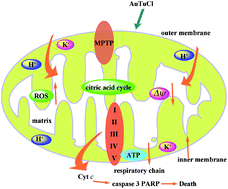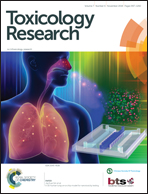Mitochondrial toxicity induced by a thiourea gold(i) complex: mitochondrial permeability transition and respiratory deficit
Abstract
Gold(I) complexes have been widely used as antibacterial and antitumor agents because of their excellent biological activities. However, there are few reports on the study of gold(I) complexes at the subcellular level. Herein, we investigated the toxicity of a gold(I) complex (N,N′-disubstituted cyclic thiourea ligand) – AuTuCl – to isolated mitochondria via various methods. The results showed that AuTuCl induced mitochondrial swelling, elevated ROS generation and triggered collapse of the membrane potential, which indicated the induction of mitochondrial permeability transition (MPT). It also enhanced the permeability of H+ and K+ of the inner membrane and declined membrane fluidity, which might be the result of MPT. Moreover, AuTuCl impaired the mitochondrial respiratory chain and suppressed the activities of complexes II and IV in the respiratory chain. It also triggered the deficiency of ATP and the effusion of Cyt c, which were strictly related to respiration and apoptosis. These results indicated that AuTuCl severely affected the structure and function of mitochondria. It was proposed that MPT and impairment of the respiratory chain were responsible for the mitotoxicity of AuTuCl, thus causing energy deficiency and even apoptosis. This conceivable mechanism can serve as a clue for better understanding of the toxicology of AuTuCl.

- This article is part of the themed collection: Toxicology Research Recent HOT articles


 Please wait while we load your content...
Please wait while we load your content...